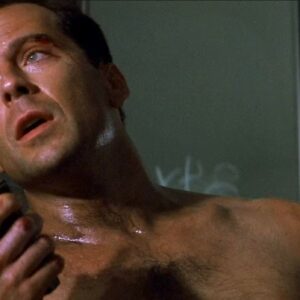Introduction
Bruce Willis is one of Hollywood’s most iconic actors, renowned for his rugged roles and the larger-than-life characters he has portrayed throughout his career. From the brash action hero to the vulnerable everyman, Willis has firmly established himself as a versatile star whose characters resonate deeply with audiences. However, beneath the surface of his intense, often fearless portrayals lies a deeper narrative of inspiration and motivation. Through his portrayal of flawed, yet resilient characters, Willis has motivated generations of viewers to confront adversity with grit, determination, and an unwavering sense of duty.
At the heart of his impact is Willis’s portrayal of the “everyman hero” — characters who are not born with extraordinary powers or skills but instead rise above their limitations through sheer willpower. His roles in films such as Die Hard (1988), The Fifth Element (1997), and Unbreakable (2000) have become cornerstones of cinematic storytelling, representing the human spirit’s capacity to overcome hardship. In this article, we explore how Bruce Willis’s roles have inspired and motivated viewers across different generations, and why his performances continue to resonate even as Hollywood evolves.
The Everyman Hero in Die Hard
One of Willis’s most iconic roles is that of NYPD officer John McClane in Die Hard (1988), a film that not only revolutionized the action genre but also established the template for the modern action hero. McClane, a regular cop from New York, finds himself alone in a high-rise building in Los Angeles, pitted against a group of well-armed terrorists. What sets McClane apart from other action heroes is his ordinariness—he is not a super-soldier, a trained assassin, or a man with an array of special gadgets. He is a flawed, relatable individual who faces overwhelming odds with nothing more than his wits and resourcefulness.
In Die Hard, Willis’s performance captured the essence of the “everyman” hero: a person who, despite not having superhero abilities, takes action in the face of overwhelming adversity. John McClane’s willingness to risk his life to save others, his resilience in the face of pain, and his everyman persona provided a refreshing contrast to the invincible action stars that had dominated the genre in the past. His ability to overcome impossible challenges—whether it’s walking barefoot on broken glass or outsmarting the terrorists—made him not just a hero, but an inspiration to audiences who saw in McClane’s struggle their own potential for resilience.
Willis’s portrayal of McClane transformed the action genre by introducing a character who was, in many ways, just like the audience—an ordinary person forced into extraordinary circumstances. The audience could relate to his fear, frustration, and determination. This was a turning point in film history, showing that heroism could come from the most unlikely of places and that even the most ordinary person could rise above seemingly insurmountable odds.
The Complexity of Willis’s Characters in Unbreakable and Glass
While Willis’s action roles are undoubtedly his most well-known, his work in M. Night Shyamalan’s Unbreakable (2000) and its sequels, Split (2016) and Glass (2019), revealed a deeper, more introspective side to his acting. In Unbreakable, Willis plays David Dunn, a man who discovers that he possesses extraordinary strength and near invulnerability. However, the film explores more than just his physical abilities—it delves into his personal struggle to accept his unique gifts and the moral responsibility that comes with them.
What makes David Dunn a compelling figure is his relatability. He is not a flamboyant, self-assured hero but a reluctant one, unsure of his place in the world. His journey is one of self-discovery, and his motivation to use his powers for good comes not from a desire for fame or glory but from a deep sense of responsibility. Unlike other comic book heroes, Dunn is not driven by a need for validation or recognition. His heroism is quiet and understated, yet profoundly impactful.
Willis’s portrayal of Dunn in Unbreakable resonates with viewers because it addresses universal themes of self-doubt, purpose, and personal growth. His performance taps into the idea that heroism is not just about fighting villains or overcoming external obstacles, but about confronting one’s own fears and limitations. David Dunn’s internal struggle to accept his true identity serves as a powerful metaphor for the way we all grapple with our own potential, and how facing our vulnerabilities can lead to our greatest triumphs.
In Glass, the final installment of the trilogy, Willis’s character is forced to confront both his own past and the larger question of what it means to be a hero in a world that often dismisses or undermines such figures. His journey is one of self-realization, proving that true heroism is about resilience, morality, and the strength to face one’s own demons. Through these films, Willis has motivated viewers to think about their own potential for greatness and the importance of embracing one’s true identity.
Resilience and Redemption in The Fifth Element
Another film that underscores Bruce Willis’s appeal as an everyman hero is The Fifth Element (1997), directed by Luc Besson. In this visually stunning science fiction film, Willis plays Korben Dallas, a former soldier turned taxi driver who is reluctantly drawn into a battle to save the universe from an evil force. Korben is not the typical heroic figure—he is flawed, cynical, and weary from years of fighting in wars. However, his internal struggle, coupled with his growing sense of duty and his blossoming relationship with the mysterious Leeloo (Milla Jovovich), ultimately leads him to embrace his role as the protector of the planet.
In The Fifth Element, Willis’s character grapples with themes of redemption and self-worth. He is initially portrayed as a man who has given up on life and feels disconnected from any sense of purpose. But as he is thrust into the larger conflict, Korben begins to rediscover his sense of duty and sacrifice. His decision to protect Leeloo, and by extension, humanity, is a testament to the power of second chances and the importance of embracing one’s higher calling, even when it seems inconvenient or overwhelming.
Through his role in The Fifth Element, Willis again exemplifies a hero who is not perfect but who finds strength through his vulnerabilities and moral convictions. This archetype of redemption and resilience speaks to viewers who may feel defeated or lost, offering them hope that they, too, can find meaning and purpose, even in the face of great adversity.
A Legacy of Inspiration: Willis’s Impact Beyond Film
Bruce Willis’s influence extends far beyond the confines of his on-screen roles. His real-life persona—marked by his candidness, perseverance, and sense of humor—has also contributed to his status as an inspirational figure. In interviews, Willis has often shared his personal struggles, from his battle with hearing loss to his reflections on aging and mortality. His openness about his challenges has endeared him to fans and reinforced the idea that even heroes face hardship.
In 2022, when Willis announced his retirement from acting due to his diagnosis with aphasia, a condition that affects language and communication, the public’s response was one of immense support and admiration. Fans praised Willis not just for his decades of work in film, but for his courage in the face of such a debilitating condition. His decision to step away from the limelight in order to focus on his health was seen as a testament to his resilience and commitment to his family. In many ways, Willis’s life has become a reflection of the themes that have characterized his most memorable roles—strength in vulnerability, courage in adversity, and the enduring power of hope.
Conclusion
Bruce Willis’s legacy as an actor is far more than just a collection of iconic roles; it is a testament to the enduring power of the human spirit. Through his portrayal of ordinary characters who rise to the occasion in extraordinary circumstances, Willis has motivated and inspired audiences across the world. Whether as John McClane in Die Hard, David Dunn in Unbreakable, or Korben Dallas in The Fifth Element, his characters remind us that true heroism is not about superhuman abilities or invincibility, but about facing our fears, overcoming obstacles, and staying true to our values. In an ever-changing Hollywood, Willis’s impact remains a constant, a reminder that the strength we often seek in our heroes is, in fact, a reflection of the strength within ourselves.





